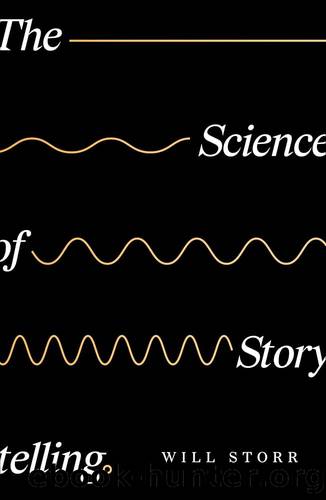A Story Is a Deal: How to Use the Science of Storytelling to Lead, Motivate and Persuade by Storr Will

Author:Storr, Will [Storr, Will]
Language: eng
Format: epub
ISBN: 9780349437224
Amazon: B0D9LF4LGQ
Goodreads: 216566222
Publisher: Piatkus
Published: 2025-02-20T08:00:00+00:00
3.8
William Shakespeareâs King Lear shows what happens when humans undergo a nightmare even more dreadful than ostracisation. Shakespeare understood that thereâs nothing more likely to make a person mad, desperate and dangerous than the removal of their status. The play is a tragedy, a form that frequently shows how hubris â which can be viewed as the making of an unsound claim to status â can bring personal destruction. Such tales were told repeatedly by the Ancient Greeks and, of course, form real-life narratives that play out continually in chimp troops and human tribes. These dramatic status reversals have probably been part of our existence for millions of years.
King Lear is a canonical example of a story in which the right external change strikes the right character at the right moment and thereby ignites a drama that feels as if it has its own explosive momentum. Its plot serves specifically to shatter its protagonistâs deepest, most fiercely defended identity-forming beliefs. Just like the story of Charles Foster Kane, its ignition point and subsequent causes and effects are the seemingly inevitable consequences of its protagonistâs flawed model of the world.
It all begins as an ageing Lear, heralded by trumpets, announces heâll divide his kingdom between his three daughters, its spoils being distributed in accordance to how well they perform in a love test. The more they adore him, the better the reward. In the defective reality that Learâs brain creates for him, heâs the unrivalled, beloved and never-to-be-disputed king of everything around him. Lear naturally accepts the reality of the world with which heâs presented. His neural models predict heâll consistently be treated with reverence and deference. This flawed model, which of course feels absolutely real and true, causes him to make mistakes that critically damage his ability to control the external world. When his manipulative daughters Regan and Goneril respond to his love test with extravagantly sycophantic oaths of boundless love, he doesnât question them. Why would he? Theyâre simply reflecting the reality his brainâs models are predicting. It would be like questioning the shining of the sun or the singing of the birds.
But Learâs third daughter, his favourite Cordelia, refuses to play. When she says she loves him no more or less than any daughter loves her father, she puts herself in conflict with his precious models. He responds as we all do, when our most sacred identity-forming beliefs are challenged. He pushes back. First, he threatens her: âMend your speech a little, lest it may mar your fortunes.â When she refuses, he disowns her: âI disclaim all my paternal care.â Cordelia will now forever be âa stranger to my heart and meâ.
Learâs commitment to his flawed models is such that when the newly powerful Regan and Goneril begin conspiring to take everything from him, he struggles to perceive whatâs happening. As the predictions his models are making about the world increasingly fail, he reacts with denial, either in the form of ape-like rage or simple disbelief. When he
Download
This site does not store any files on its server. We only index and link to content provided by other sites. Please contact the content providers to delete copyright contents if any and email us, we'll remove relevant links or contents immediately.
Cecilia; Or, Memoirs of an Heiress — Volume 1 by Fanny Burney(32558)
Cecilia; Or, Memoirs of an Heiress — Volume 2 by Fanny Burney(31956)
Cecilia; Or, Memoirs of an Heiress — Volume 3 by Fanny Burney(31942)
The Lost Art of Listening by Michael P. Nichols(7506)
Asking the Right Questions: A Guide to Critical Thinking by M. Neil Browne & Stuart M. Keeley(5775)
We Need to Talk by Celeste Headlee(5615)
On Writing A Memoir of the Craft by Stephen King(4944)
Dialogue by Robert McKee(4404)
Pre-Suasion: A Revolutionary Way to Influence and Persuade by Robert Cialdini(4232)
I Have Something to Say: Mastering the Art of Public Speaking in an Age of Disconnection by John Bowe(3887)
Elements of Style 2017 by Richard De A'Morelli(3350)
The Book of Human Emotions by Tiffany Watt Smith(3309)
Fluent Forever: How to Learn Any Language Fast and Never Forget It by Gabriel Wyner(3083)
Name Book, The: Over 10,000 Names--Their Meanings, Origins, and Spiritual Significance by Astoria Dorothy(2987)
Why I Write by George Orwell(2954)
Good Humor, Bad Taste: A Sociology of the Joke by Kuipers Giselinde(2950)
The Art Of Deception by Kevin Mitnick(2804)
The Grammaring Guide to English Grammar with Exercises by Péter Simon(2744)
Ancient Worlds by Michael Scott(2688)
